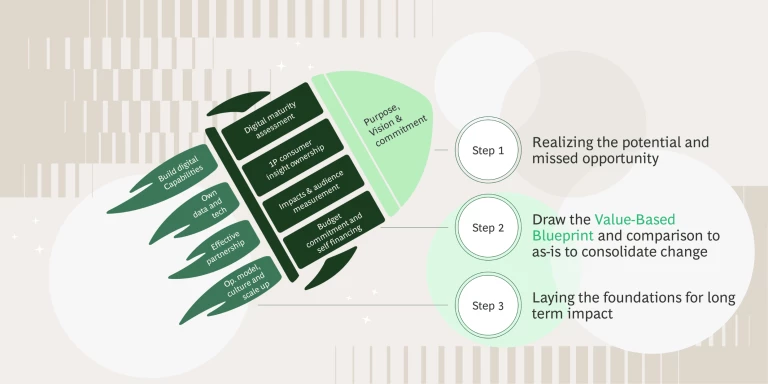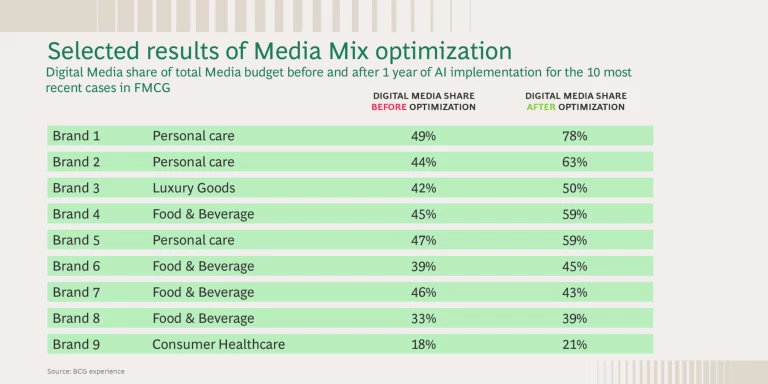The digital landscape surrounding the Italian FMCG industry is experiencing a “Quiet Revolution”, influenced by rising consumer digitalization, online experiences and AI driven personalization. Companies are required to shift their perspectives and remodel various forms of media to capture occasions and influence the pathway followed by consumer choice.
The proportion of marketing budgets dedicated to digital continues to rise significantly throughout the world, showing a CAGR between 10% and 20%, depending on country-industry combinations, and an overall penetration of up to 50%–60% of total spend for most advanced industries, such as Media & Tech and Consumer Finance.
The Italian FMCG industry, however, is still navigating this change, with digital currently representing only 33% of media budgets, reflecting an overall hesitance to embrace digital with the same confidence as with television, print, and other traditional channels (despite digital channels showing an ROI of up to 2.5x over traditional—still investments magnitude needs to be factored in order to firmly state the comparison).
Our analysis shows that companies should strive to seamlessly integrate digital strategies into their traditional media approaches, as they already have the tools to be present at every stage of a consumer’s decision pathway.
The pronounced allocation toward TV by the Italian FMCG sector can be attributed to the following:
- Traditional handling of digital strategies, treating them similarly to classic advertising campaigns
- Need to increase analytics maturity when extracting insight from data that provides visibility into consumer behaviors and preferences, which is crucial for optimizing strategies
- Unclear measurement frameworks that lead to ambiguities in evaluating performance across all media channels, limiting the possibility of making bold moves
- Decision-making that is sometimes too far down the decision lines, limiting companies’ innovation potential and budget allocation as investments discussion happen on an operational basis

In our fast-moving, evolving, globalized world, investing exclusively in traditional communication methods is simply insufficient, particularly given that consumers divide their attention between digital and traditional channels.
In this paper, we highlight three steps to propel digital strategies toward a needed and thoughtful transformation, starting from emotionally embracing change by anchoring it to the core purpose of a company/brand (what will never change) and understanding where digital plays a more complementary role (what change is needed).
The first step for FMCG companies is to have a unified and embraced vision. In an industry dominated by traditional approaches, advocating for change requires unwavering commitment and belief. In our view, commitment stems not only from inspiration but also from a foundational, ground-up strategy. Recognizing the starting point is crucial, as is possessing an intrinsic desire to measure outcomes accurately and invest wisely in people, technology, and data.
The second fundamental step is to make the case for change in order to cement the vision and build commitment. To this end, we believe that there is a set of four key principles to ideate a value-based blueprint to help quickly scale initiatives and effectively ignite a digital transformation that encompasses data and measurement as cornerstones of a “mass-precision” approach in digital strategies.
We are aware of the fact that vision alone is not nearly enough to transform a company. We therefore look to our experience to help us identify the key pillars that need to be put in place (Step 3) to ensure operational challenges do not bring it to a stop.
The following is a breakdown of each chapter of the paper:
- Chapter 1. A portrayal of media investment scenario across industries and geographies
- Chapter 2. An analysis of the potential of digital advertising to contribute to traditional media strategies
- Chapter 3. An introspection of the major challenges faced by brands to prove the value of digital
- Chapter 4. Creating an action plan to help FMCG companies navigate the shift to digital

This journey isn't merely a transition—it's a transformative process, one that signals a leap into a brighter and more innovative future. Many progressive FMCG companies have already embarked on this path, positioning themselves at the forefront of a fast-evolving, data-centric era, thereby solidifying their competitive advantage for the years to come.
The authors would like to thank the following for their invaluable contribution to this paper: Leila Hamidou, Alvise Scaroni, Henry Leon, David Galley, and Leonardo Fascione.





